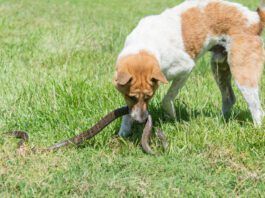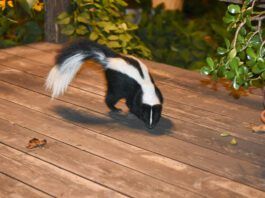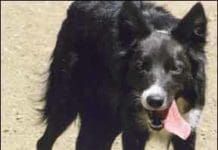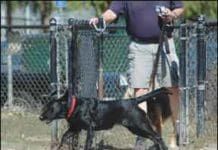Preparing Your Dog for Airplane Travel
The ability to carry a little dog onto an airplane with you is one of the greatest advantages of owning a small dog that can't be shared by owners of medium or large dogs. Most (though not all) of the risks of flying a dog on a commercial flight are posed by the dog's handling by airport employees behind the scenes and by the dog's unattended experience in the cargo hold of the plane; in contrast, the risks to a dog who is with you at every moment of your flight are very slight and under your control. That said, there are a lot of things you need to know and contingencies for which to prepare if you are going to subject your dog to air travel. Here's how to make the carried-on dog's flight as enjoyable and stress free (for both of you) as possible.
Raccoon Attack Update
As I described in WDJ’s July issue, on the night of June 1st, my dog Ella, an 11-pound Norwich Terrier, was attacked by a raccoon in my backyard. Fortunately, I was able to fight off the raccoon myself, and Ella escaped with only puncture wounds, which healed quickly after being treated at the emergency vet. Emotionally, however, she was a wreck, terrified to go into the backyard, and showing signs of anxiety in the evenings when she saw or heard anything outside. I started her on anti-anxiety medications to help her cope with the aftermath of the attack, and to prevent her anxiety from escalating.
Raccoon Removal Tips
I contacted a different wildlife rescue and control company for additional help with getting rid of the raccoon who was living under my deck. Some of their suggestions conflicted with what I had been told by the county vector control agent. Here is a summary of what this company told me.
Dog Got Skunked? DON’T Use Water (At Least, Not at First)
Chemist Paul Krebaum gets the credit for applying his chemistry knowledge to the age-old need for a substance that can neutralize the smell of skunk spray. He researched the putrid oil (which skunks can shoot out of special glands under their tails as a potent defense mechanism) and determined that the chemical responsible for the distinctive odor was in a class called thiols. The human nose is extremely sensitive to these organosulfur compounds, and can detect them at 10 parts per billion. But if you subject the substance to just the right compound, you can inactivate the chemicals responsible for the odor, as fast as a chemical reaction can occur.
Raccoon Attack!
One of my worst dog-owner nightmares recently came true. Or I should say, almost came true. A raccoon attacked my dog, injuring her, but I was able to save her life by fighting off the raccoon myself! As bad as that experience was, I never imagined the problems I would have to deal with that have emerged since our initial suburban wildlife encounter.
Plant Oils for Dogs
There are many different types of plant oils that people use to supplement their dogs’ diets, including oils from flaxseed, olives, coconut, vegetables, hempseed, and more. Some of these oils can provide benefits, but others are not helpful and may even contribute to inflammation.
When to Seek Veterinary Care After Your Dog Has a Close Call at the...
Did Your Dog Have a Scary, Sinking Moment in the Water? “If the dog comes out and he’s fine, he’ll shake it off,” says Jules Benson, DVM. “You need to watch him for the next 24 to 48 hours, because that’s when aspiration pneumonia (caused by water going down into the main-stem bronchi) can occur. Especially if it’s water other than a pool, where there could be bacteria or protozoa in the water. If they aspirate any of that and it goes into the lungs, the bacteria spreads and multiplies.
Keep Your Dog Safe Around the Pool this Summer
both in the water and facing away from her owner.üIt's vitally important to teach your dog to enter and exit a pool by its stairs
Determining the Cause of Your Dog’s Panting
I’m awakened by the exhalation of my Border Collie’s warm breath on my face: heh-heh-heh. I slowly open one eye and focus on the nose just inches from my own. I may be anthropomorphizing, but I suspect he’s grinning. There it is again – a breathy heh-heh-heh. Wait a minute! Is he just panting or is he laughing at me? Given the way dogs are designed, panting is a very normal bodily function. Dogs don’t have sweat glands throughout their body to expel heat like humans do.
Merial Runs Out of Immiticide for Heartworm Treatment
The supply of Immiticide (melarsomine dihydrochloride), the only drug approved to treat heartworm infections in dogs, has been low since December 2009, but now it’s completely gone. Merial confirmed that it was officially out of the drug on August 9, 2011. The current situation is due to a new and separate manufacturing challenge related to technical issues with the company who provides the finished product, according to a Merial spokesperson. Merial said the company is working hard to make the drug available again, but cannot speculate when that might happen.
Sample Dog Park Rules
Park rules should be posted prominently near park entrances if they're not, ask about them prior to bringing your dog to the park, and make sure you are able and willing to comply. Here are some of the rules that you are likely to find...
Dogs Riding Safely and Calmly in Cars
Contrary to the advice I offer to clients and WDJ readers, I admit that I'm sometimes careless about taking my dogs in the car with me. I don't always use crates and seatbelts on short trips to town, although I always do on longer travels. Just recently, however, my husband and I loaded up all five of our dogs for their annual well-pet visit to a veterinarian, and I did take the precaution of crating everyone rather than risk canine chaos on the highway. Other than Bonnie's panting, it was an experience in car-ride serenity, and I vowed to crate everyone, always, on future rides. Granted, my dogs aren't the worst in the car. They don't sit in my lap, leap over seats, get into fights, hang out the windows, do laps around the back of the van, or bark at everything outside the car. Other than Bonnie, who pants a lot and sometimes Even so, they're safer in crates. Loose, they are a distraction, which decreases my driving safety. Not as bad as texting, but still!
















